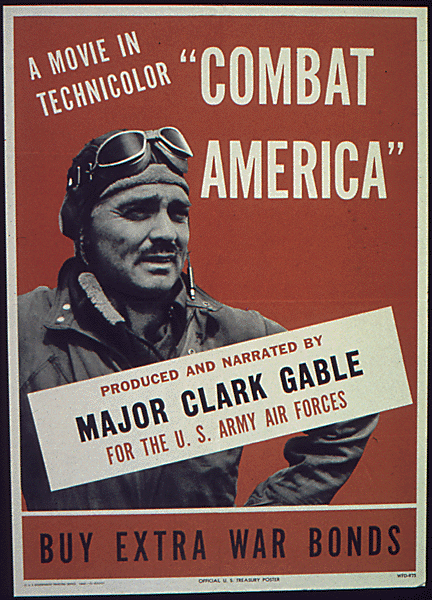William Clark Gable was born on February 1, 1901, in Cadiz, Ohio.Gable was inspired to become an actor after seeing the play The Bird of Paradise at age 17. He eventually moved to Hollywood after working in theater in Oregon and found steady movie work alongside stars such as Joan Crawford.
Known for his suave demeanor and charisma, Gable rose to fame in the 1930s and ’40s. Soon he was Hollywood’s leading man and he became known for his legendary roles in classics like “Gone with the Wind” and “It Happened One Night.”
But two events soon changed his life. The Japanese attacked Pearl Harbor on Dec. 7. 1941, drawing the United States into World War II. The following month, Gable’s beloved wife Carole Lombard was killed in the crash of a DC-3 airliner. She was returning from a war bonds tour.
Many Hollywood stars joined the war effort after the bombing of Pearl Harbor, and some, such as James Stewart, signed up for active duty. Lombard sent a telegram to President Franklin D Roosevelt prior to her death expressing Gable’s interest in also doing so, but F D R thought the actor could best serve by increased patriotic roles in movies and bond drives.
Still, Lombard’s death profoundly impacted Gable and spurred him to take action. On August 12, 1942, at the age of 41, Gable joined the United States Army, under the Army Air Forces. Shortly after his enlistment, Gable was sent to Miami Beach, Florida, for training.
Movie studio MGM was reluctant to let him go. Commanding General of the U.S. Army Air Forces Henry H Arnold offered Gable a special assignment with the First Motion Picture Unit. Here, Gable was tasked with making a film in combat with the Eighth Air Force to recruit aerial gunners.
The First Motion Picture Unit was commanded by Jack Warner, head of Warner Brothers, and flight operations were commanded by Hollywood Pilot Paul Mantz, who was famous for his stunt flying in films. Other members of the unit have included Alan Ladd, Ronald Reagan and Van Heflin.
To prepare for his mission, Gable trained in Florida, Washington State and Texas.In 1943 he accompanied the 351st Bomb Group to England as head of a six-man motion picture unit.
Despite facing initial skepticism from the military establishment, Gable was determined to serve in a meaningful capacity. His fame was both an asset and a hindrance; while it attracted attention, it also required him to prove his dedication.
Gable underwent rigorous training, immersing himself in the demands of military life. He attended Officer Candidate School and trained as an aerial gunner. Many fellow recruits warmed to Gable when they found him a modest man who refused special living quarters, opting to share with the men and joining them in action.
Gable also used his celebrity status to participate in various morale-boosting activities, including radio broadcasts and training films. His presence brought a touch of glamor to military bases and boosted the spirits of troops stationed far from home.
An unusual detail of Gable’s service during the war was that Adolf Hitler was a fan of the actor and once offered a large bonus to anyone who could bring Gable to him unharmed.
Gable traveled to England in February 1943 where he flew five combat missions, at least one of which was dangerous.
In a raid on Germany, Gable’s aircraft came under fire, lost an engine and had its stabilizer damaged. One crewman was killed in the mission, and two were injured. Flak went through Gable’s boot and narrowly missed his head.
When word of this reached MGM, studio executives stepped up pressure on the Army Air Forces to reassign Gable to noncombat duty. In October 1943, Clark Gable returned to the US, and he worked on his film about the aerial gunners on an old Warner’s lot donated to the war effort in Los Angeles. He was placed on inactive duty and on June 12, 1944, his discharge papers were signed by Captain (and later U.S. president) Ronald Regan.
Gable completed editing of the film Combat America, which was released in January 1945. Gable narrated the film and held interviews with numerous gunners.
Gable resigned his commission on September 26, 1947 as his motion picture production schedule made it impossible for him to fulfill reserve officer duties. He was awarded military honors for service: the Distinguished Flying Cross, Air Medal, American Campaign Medal, European-African-Middle Eastern Campaign Medal, and World War II Victory Medal.
Gable continued to make movies until his death of a heart attack at the age of 59 on November 16, 1960.
Gable’s decision to join the Air Force resonated deeply with the American public. He symbolized the patriotic spirit that drove countless individuals to sacrifice their personal comforts and risk their lives for the nation.
